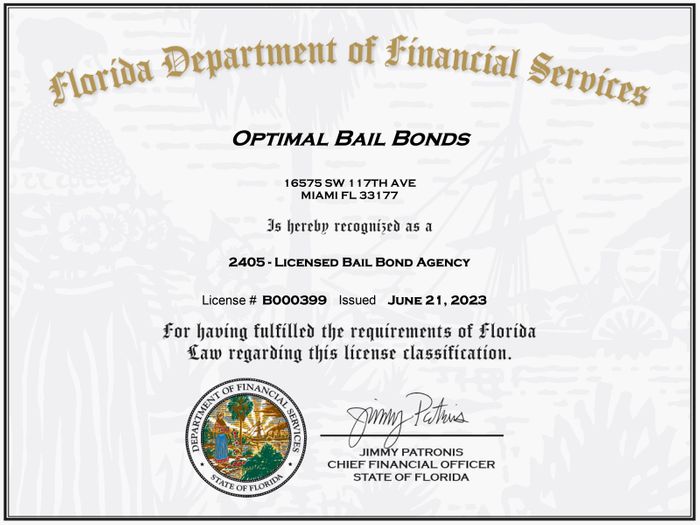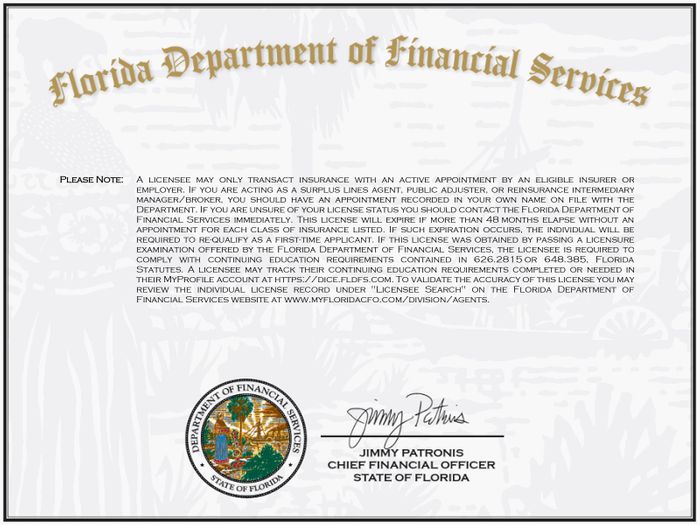The Licensing and Appointment of Bail Bond Agents
Bail Bonds Miami
Your Freedom Specialist

Covers the licensing and appointment of bail bond agents in Florida. It explains the two types of bail bond agents in the state, detailing the process for their suretyship justification, application procedures, qualifications, and state examination requirements. Also discusses the issuance of licenses and the appointment of limited surety agents, including restrictions on who may hold a license. This information provides a comprehensive understanding of the regulatory framework and professional requirements for bail bond agents in Florida.
Any person in Florida who writes criminal defendant’s bonds for a fee must be licensed by the Florida Department of Financial Services. A license may be granted to write bonds in one of two ways:
Professional Bail Bond Agents are independent men and women who are not backed by insurance companies. They justify the sufficiency of their suretyship by attaching cash, a cashier’s check, or a postal money order to each bond.
Limited surety agents are agents of insurance companies. They justify their suretyship by attaching a power of attorney to each bond, which pledges the assets of the company as security for the undertaking. Their bonds are often called “corporate suretyship.”
The first step for either is to apply for the license. Florida Statutes 648.34 and 648.38 (which are augmented by other statutes and rules as noted) give guidelines for this procedure.

Qualifications
To be eligible for a bail bond agent license, candidates must demonstrate adherence to the stipulations of §648.355, including the acquisition of a temporary license pursuant to this section. It must be clearly established that the applicant satisfies the following conditions at the time of application and maintains them throughout the license period:
Age: The applicant must be an individual who is at least 18 years old and possesses a high school diploma or its equivalent.
Residence: The applicant must be a genuine resident of the state.
Office: The business operations of the applicant are to be based within the state. The applicant is required to be actively involved in the bail bond industry and must keep a business office that is open to the public during standard business hours.
Education: In the four years leading up to the application, the applicant must have completed a fundamental certification course related to the criminal justice system. This course should comprise no fewer than 120 hours of instruction, and the applicant must achieve a grade of at least 80 percent. Additionally, the applicant must have successfully finished a correspondence course for Bail Bond Agents that is sanctioned by the department.
Character: The applicant should be recognized as a person of commendable character and proven integrity. They must not have been convicted of, nor pleaded guilty or no contest to, any felony or any crime involving moral turpitude or any offense punishable by imprisonment of one year or longer, under the laws of any state, territory, or country, regardless of whether a judgment or conviction has been formalized.
Furthermore, as required by F.S. 648.35, the application for a professional Bail Bond Agent’s license must be accompanied by the following:
Finances: A comprehensive financial statement sworn to under oath.
Rates: A proposal for the rating plan intended for use, which must receive approval prior to the issuance of the license.

Investigation
Upon receipt of the application in Tallahassee, the Department of Financial Services is authorized to initiate an exhaustive review of the applicant. This scrutiny encompasses an analysis of criminal history, credit ratings, employment history, educational achievements, and a thorough examination of the applicant’s life—both historical and current.
Additionally, the Department may secure reports on the applicant’s creditworthiness and character. These evaluations are performed by a reputable and independent reporting agency and are conducted at the cost to the applicant.
This meticulous evaluation process is similarly undertaken whenever an individual holding a temporary bail bond agent designation seeks to obtain a limited surety agent license or a permanent bail bond license.

State Examination
Should an applicant satisfy all the outlined prerequisites, they will be deemed qualified to sit for the state examination. The scheduling and location of these examinations are determined by the Department of Financial Services. Applicants will be issued an authorization notice by the Department, granting them a 90-day window to undertake the examination.
The Department of Financial Services is responsible for the creation of the examination, and the content of the test is kept confidential. According to the statute, the examination's scope is intended to be as comprehensive as the bail bond industry itself. Despite the breadth of topics covered, it is highly improbable that the examination will include questions not addressed in the mandatory courses.
In the event of a failed attempt, the examination can be retaken after a 30-day waiting period, contingent upon the payment of an additional fee. It is important to note that the Department is not permitted to issue refunds for examination fees as per §648.38(3) of the Florida Statutes. While the statute does not specify a limit on the number of attempts allowed for passing the examination, applicants are required to pass within a timeframe designated by the Department, or they must reinitiate the application process. Furthermore, an individual who does not pass the examination after three attempts is required to repeat the 120-hour course and achieve a minimum grade of 80% before reattempting the examination.

Denial of State Examination
The Department of Financial Services reserves the right to refuse examination eligibility to any applicant failing to fulfill the specified qualifications or deemed unsuitable to obtain a license following a comprehensive review. This refusal essentially equates to a denial of licensure.
Individuals facing such denial have the option to submit a new application within a 30-day period, initiating the entire procedure anew. Nevertheless, without addressing and rectifying the issues that led to the initial denial, the likelihood of a different outcome remains low.
OUR PROCESS
As compassionate professionals, we understand that people in need of a bail bondsman are generally going through a tough phase. We do not add to your troubles with the burden of heavy paper work and complicated process. We actually stand by your side offering all the support you need in those trying times. We take care of the legal hassle, paperwork, and procedures involved in the process, thus taking the pressure off your head and offering you as much peace as possible.
OUR POLICIES
We have client-centric policies to ensure a comfortable process and highly satisfactory experience for you. We accept payment in multiple modes including check and credit cards. We won’t bother you with unnecessary questions and hectic paperwork. Most importantly, we are available for you round the clock. You can reach out to us at any hour of the day or night, and we will make it our responsibility to ensure quick procurement of bail.
Get Your Freedom Back With a Bail Bond







